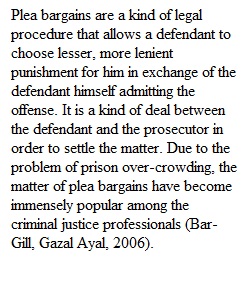


Q When discussing ethical dilemmas that are unique to the legal profession, the topic of plea bargaining oftentimes comes up. "In a plea bargain, the defendant agrees to plead guilty, usually to a lesser charge than one for which the defendant could stand trial, in exchange for a more lenient sentence, or so that certain related charges are dismissed. (From FindLaw at http://criminal.findlaw.com/criminal-procedure/plea-bargains-overview.html ) Imagine you are a case consultant working for the district attorney's office where you are presented with the ethical dilemma surrounding the prosecution of a burglary case. The defendant is willing to plead guilty in return for a sentence of probation, and you believe that this is a fair punishment, particularly in light of the overcrowding of the local correctional facilities. Although a thorough investigation was conducted, you are informed the evidence that is available may not support a conviction. However, the victims are upset and want to see the offender receive prison time. You realize that these victims are taxpayers, so they pay your salary. What should you do? Support your decision by constructing a logical argument for the course of action you choose. Remember to cite your supportive resources.
View Related Questions